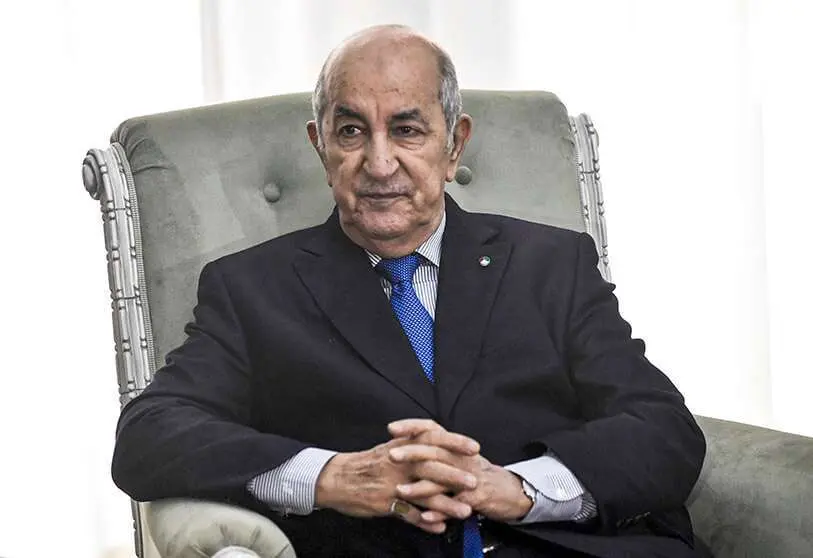Tebboune foresees a "return to normality" in relations with France

Abdelmadjid Tebboune, the Algerian president, announced his prediction of a return to normal relations with France in the midst of the coronavirus crisis, on the condition that they be on 'equal terms'.
French President Emmanuel Macron, in a statement issued on 2 October by the French daily Le Monde, accused Algiers and its "political-military" system of having a "commemorative rent", and of rewriting a history whose basis is not in truth. According to Le Monde, Emmanuel Macron also questioned whether Algeria existed as a nation before French colonialism, and questioned Turkey's previous involvement, fascinated by its ability to make people forget the role it played in Algeria during the Ottoman Empire.
"I am fascinated by Turkey's ability to make people forget the role it played in Algeria and the domination it exercised," Macron added. These statements infuriated the Algerian rulers, who found them offensive, arguing that they were false. As a result, they banned French military flights over their territory in the Sahel service, where troops of the anti-jihadist operation Barkhane are deployed, and recalled their ambassador to Paris.

Abdelmadjid Tebboune said in an interview with various Algerian media on Friday that "it is necessary that these relations return to normal, provided that the other party (France) conceives them on equal terms, without provocation". "We agreed that we would deal with each other so as not to harm the interests of each of the parties, but we will not accept anything being imposed on us," the Algerian leader added.
Likewise, on 10 November, the French presidency communicated that Emmanuel Macron "regrets the controversies and misunderstandings" that have arisen with Algeria and clarifies, with the utmost certainty, that he has "the greatest respect for the Algerian nation" and for "its history". Ramtane Lamamra, head of Algerian diplomacy, welcomed these declarations, which "showed respect" for his country, on the part of the French president.
In the interview, Tebboune criticised last week's visit to Morocco by Benny Gantz, the Israeli defence minister, referring to the security cooperation contract signed between Morocco and Israel, describing the interview as "shameful" and that it could represent "a threat" to his country. Historically, Morocco and Algeria have been rivals in the Maghreb for several years.

It is also worth noting that this Saturday local elections will be held in Algeria, considered of the utmost importance to end the mandate of the late President Abdelaziz Bouteflika, in which more than 23 million Algerians are called to the polls. Despite this, the forthcoming election of municipal and provincial councils has not attracted much interest, with hardly any rallies being organised where candidates were not sufficiently active, and a few billboards were hung.
Experts predict a drop in turnout compared to the other elections held in the wake of the pro-democracy Hirak movement protests, which defeated President Bouteflika, who died aged 84 in September, in April 2019.
The vote would be the third organised under President Abdelmadjid Tebboune, who pledged to reform all institutions after Bouteflika's rule. Tebboune himself was elected in December 2019, with 58% of the vote and a turnout of almost 40%. The Algerian head of state assured on 5 June, at the independence celebrations, that his steps followed the path of the "authentic Hirak". In his first organised vote, the president introduced some constitutional amendments in a referendum approved in November 2020 by 23.7% of the total electorate.

His second vote was held on 12 June in a legislative election in which there was a high abstention rate and only 23 per cent turnout, although this rate "does not matter", according to Tebboune after the June legislative elections. "What matters to me is that those for whom the people vote have sufficient legitimacy", he added.
In these third elections, more than 34,000 candidates are expected to stand for the councils of more than 1,500 municipalities and 58 prefectures, of which only 15 per cent are women, according to the Independent National Election Authority. However, Redouane Boudjemaa, professor of journalism at the University of Algiers, described the vote as "an attempt to clean up the facade of local councils by changing their members to benefit the ruling class". "Politics at the moment is limited to slogans proclaiming that the country has entered a new era, when all indicators point to the contrary," added Boudjemaa.
Algerian President Abdelmadjid Tebboune speaks of the current local elections as "the last station for building a modern state", which ensure "an economically strong state in an atmosphere of democracy and freedom given to the citizen". "We are looking for legitimate institutions that are not flawless, and that have no complaints of fraud, and this is a result we have achieved today," Tebboune added.








